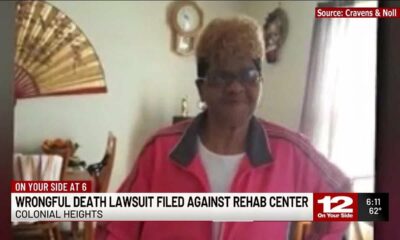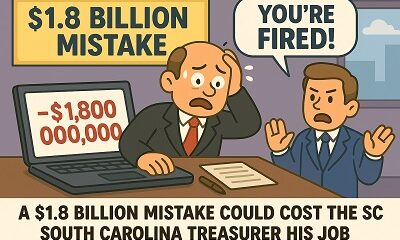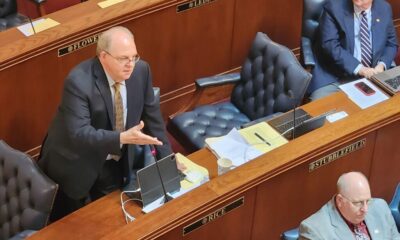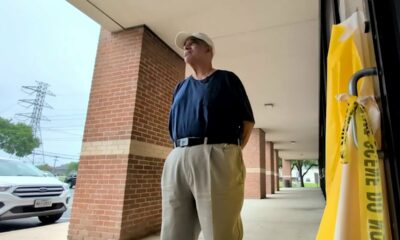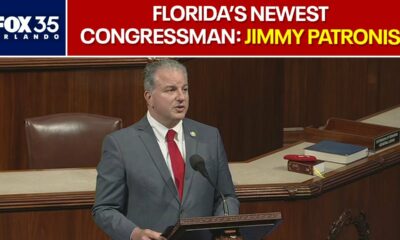News from the South - Virginia News Feed
Funding for program DC firefighters used in Potomac crash recovery under review | NBC4 Washington
SUMMARY: Funding for the sonar technology used by DC firefighters in the Potomac crash recovery is under review by the Trump administration, amid broader federal spending freezes. Recently, first responders employed this advanced sonar system to quickly locate debris from a midair collision, significantly shortening the search time for victims’ families. The sonar, financed through a FEMA port security grant, has proven invaluable, even potentially uncovering remnants from past aviation tragedies. However, the program faces budget uncertainties, with the National Transportation Safety Board recognizing the critical role of these grants in ensuring safety. The future of such funding remains unclear as reviews continue.

After a regional airplane collided with an Army helicopter, D.C. Fire and EMS deployed sonar technology to scan the bottom of the …
News from the South - Virginia News Feed
Family files wrongful death lawsuit against Colonial Heights rehab center
SUMMARY: The family of 78-year-old Geraldine Richardson has filed a wrongful death lawsuit against Colonial Heights Rehabilitation and Nursing Center, alleging negligence in her care. Richardson, who had dementia and difficulty walking, died on March 7, 2023, after developing severe pressure ulcers and sepsis during her two-year stay at the facility. The lawsuit claims she was malnourished and suffered unnoticed strokes, with inadequate repositioning contributing to her condition. This legal action follows an ongoing investigation into the facility linked to the death of another resident. The Richardson family seeks over $10 million in damages.

A wrongful death lawsuit has been filed against Colonial Heights Rehabilitation and Nursing Center.
News from the South - Virginia News Feed
Dominion Energy proposes to increase rates starting summer 2025
SUMMARY: Dominion Energy plans to increase rates starting summer 2025, with an average increase of about $20 per month. The company cites inflation, high labor costs, and the need for power grid upgrades as reasons for the hike. This is the first rate increase since 1992, and residents express concerns that higher prices won’t improve service reliability. Proposed changes include a $10.92 increase in fuel rates from July 1, followed by base rate increases of $8.51 and $2 in subsequent years. Critics emphasize the need to avoid overburdening residential customers while accommodating increased demand from data centers.

They’re blaming the jump on the pressure of inflation, high labor costs, and the need for power grid upgrades and supplies.
For more Local News from WWBT: https://www.12onyourside.com/
For more YouTube Content: https://www.youtube.com/channel/UCh-MRi3cyDN0DO1AvvVYFlg
#dominionenergy #consumer #Virginia #Richmond #12onyourside #localnews #money
News from the South - Virginia News Feed
Political theater takes center stage as legislature returns for veto session
by Markus Schmidt, Virginia Mercury
April 2, 2025
The Virginia General Assembly is set to reconvene Wednesday for what will likely be a long, one-day session that’s equal parts policymaking and political theater, as lawmakers face off over Gov. Glenn Youngkin’s sweeping amendments to 159 bills — including major changes to the state budget.
Youngkin finished acting on all 915 bills sent to him during the 2025 session by last week’s Monday midnight deadline. He signed 599, vetoed 157, and sent back 159 with recommended changes — including a staggering 205 proposed amendments to the budget bill, House Bill 1600, and eight item vetoes.
While many of the vetoes — including on bills to create an adult-use cannabis retail market, raise the minimum wage, allow public-sector unions and tighten how the Virginia Department of Elections processes voter registration data — were expected, none are likely to be overridden. That would require a two-thirds majority in both chambers, and Democrats hold only slim leads: 51-49 in the House, and 21-19 in the Senate.
Governor unleashes veto storm to drown progressive legislation
Instead, the real legislative drama lies in how lawmakers will handle the governor’s amendments — especially those to the budget and several controversial policy bills that set the stage for a partisan clash that could shape not just legislation, but the narrative heading into this fall’s critical gubernatorial and House of Delegates elections.
Stephen Farnsworth, a political analyst from the University of Mary Washington, offered a candid assessment of Virginia’s current legislative dynamics this year, characterizing both the regular and Wednesday’s veto session as exercises in political positioning rather than substantive governance.
“This was a kick-the-can-down-the-road legislative session, and it will be a kick-the-can-down-the-road veto session,” he said.
According to Farnsworth, lawmakers from both sides are focused on shaping narratives ahead of the November elections rather than crafting major policy shifts.
While he expects the veto session to be largely uneventful — “Veto sessions are usually anti-climactic as long as there is general overall agreement on the shape of the budget, and for the most part there is” — he acknowledged that some amendments might slightly nudge legislation in Youngkin’s favor.
One such example Farnsworth pointed to was the governor’s initiative to explore making Oak Hill, the historic residence of President James Monroe in Fairfax County, a state park. He noted the unusual nature of the proposal, given the region’s political leanings and spending patterns.
“Republicans don’t often say ‘let’s spend money in Northern Virginia,’” Farnsworth observed, adding that some Democrats might find the idea more palatable than expected: “There might be some Democratic lawmakers who might say it’s easier to say yes to this than no.”
One example of a proposal that is expected to be caught in limbo, however, is HB 1923, which seeks pay parity for midwives. Rather than sign or veto the bill, Youngkin proposed an amendment requiring the Health Insurance Reform Commission to assess the issue and added a reenactment clause — meaning the bill would need to pass again in 2026 to become law.
Youngkin signs several maternal health bills, tweaks another on unconscious bias training
On the matter of cultural competency and unconscious bias training, Youngkin is once again pushing back. For the second year in a row, he’s offered an alternative to Senate Bill 740 by Sen. Mamie Locke, D-Hampton, and HB 1649 by Del. Cliff Hayes, D-Chesapeake, which would require medical professionals to complete such training to renew their licenses.
As in 2024, Youngkin’s proposed substitute eliminates references to “unconscious bias” and “cultural competency,” replacing them with language focused on serving populations with high maternal mortality and related health disparities. His version also caps the training at two hours.
While Youngkin has expressed support for expanding access to doulas, his amendment to HB 1614 by Del. Adele McClure, D-Arlington, and SB 1418 by Sen. Lashrecse Aird, D-Petersburg, which would allow up to 10 doula visits to be covered by state health insurance, raised eyebrows by changing “birthing people” to “birthing women.”
Supporters argue the original language was meant to be inclusive, since it reflects the fact that transgender and nonbinary people may become pregnant, groups which Youngkin’s edit excludes.
Youngkin also revised HB 2724 by Del. Charniele Herring, D-Alexandria, which regulates the use of automatic license plate recognition (ALPR) technology. While the bill originally limited data retention to 21 days, his amendment extends that to 30 — a modest expansion that still keeps a firm deletion requirement.
The bill strictly regulates how law enforcement can use ALPR data — only in criminal investigations, missing persons cases, and tracking stolen vehicles or wanted individuals — and requires state approval of all such systems.
In the realm of data centers, Youngkin amended HB 1601, sponsored by Del. Josh Thomas, D-Prince William, loosening requirements for environmental and noise assessments.
The original bill required a detailed site analysis before new high-energy -use facilities (HEUFs) could be approved. Youngkin’s version makes that optional for localities and adds flexibility for examining other environmental impacts. He also clarified that the bill wouldn’t take effect unless reenacted in 2026 and wouldn’t interfere with local zoning powers.
Youngkin’s most sweeping changes come in the budget, where he rolled back major Democratic spending priorities.
Youngkin tweaks state budget with eye on federal cuts, but embraces key spending
He also cut $20 million from a proposed rental assistance pilot and removed $15 million designated for a first-time homebuyer grant program. His amendments further eliminate $138 million allocated for school support staff, along with $25 million for HVAC upgrades at Nottoway Correctional Center.
He revived a previously rejected proposal to allocate $25 million for private school scholarships, which would offer $5,000 vouchers to 5,000 low-income families to use toward nonpublic education — a move critics say siphons resources from public schools.
Democrats had proposed tax rebates to return about $1 billion to Virginians. Youngkin pushed instead for structural tax changes, including eliminating the unpopular car tax and exempting tips from taxation — both ideas that were rejected by the legislature.
Still, Youngkin embraced a core Democratic initiative by proposing to make 20% of the Earned Income Tax Credit permanently refundable. Without that change, the enhanced refundability is set to expire in 2027.
He also added controversial language that would withhold state funding from local law enforcement agencies that fail to cooperate with U.S. Immigration and Customs Enforcement (ICE).
Not all of Youngkin’s recommendations were partisan flashpoints. He agreed to send out tax rebate checks — $200 for individuals and $400 for joint filers — and backed bonus payments for public workers. Teachers would receive $1,000 bonuses, while state employees would get 1.5% bonuses on top of their already approved 3% raises starting July 1.
The Democratic majority has the numbers to reject many of Youngkin’s amendments without triggering a budget crisis. Thanks to Virginia’s biennial budget system, state funding is already in place for the fiscal year that begins July 1. However, any budget item rejected by the legislature could still be vetoed individually by the governor.
And Wednesday’s session may not be the last word on the budget. Lawmakers could reconvene later in a special session to address unforeseen federal impacts, such as layoffs or funding cuts, under the terms of a resolution passed earlier this year.
GET THE MORNING HEADLINES.
Virginia Mercury is part of States Newsroom, a nonprofit news network supported by grants and a coalition of donors as a 501c(3) public charity. Virginia Mercury maintains editorial independence. Contact Editor Samantha Willis for questions: info@virginiamercury.com.
The post Political theater takes center stage as legislature returns for veto session appeared first on virginiamercury.com
-

 Mississippi Today23 hours ago
Mississippi Today23 hours agoPharmacy benefit manager reform likely dead
-

 News from the South - Alabama News Feed6 days ago
News from the South - Alabama News Feed6 days agoSevere storms will impact Alabama this weekend. Damaging winds, hail, and a tornado threat are al…
-

 News from the South - Alabama News Feed5 days ago
News from the South - Alabama News Feed5 days agoUniversity of Alabama student detained by ICE moved to Louisiana
-

 News from the South - Oklahoma News Feed4 days ago
News from the South - Oklahoma News Feed4 days agoTornado watch, severe thunderstorm warnings issued for Oklahoma
-

 News from the South - Virginia News Feed5 days ago
News from the South - Virginia News Feed5 days agoYoungkin removes Ellis, appoints Cuccinelli to UVa board | Virginia
-

 News from the South - Florida News Feed7 days ago
News from the South - Florida News Feed7 days agoPeanut farmer wants Florida water agency to swap forest land
-

 News from the South - Kentucky News Feed6 days ago
News from the South - Kentucky News Feed6 days agoA little early morning putting at the PGA Tour Superstore
-

 News from the South - Georgia News Feed4 days ago
News from the South - Georgia News Feed4 days agoGeorgia road project forcing homeowners out | FOX 5 News

